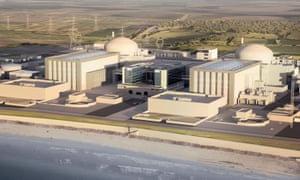Ministers need to talk to the Chinese about fast-tracking the planned reactor at Bradwell in Essex because the future of the £18bn Hinkley Point project is so uncertain, according to a leading pro-nuclear campaigner.
Tim Yeo, a former chair of the energy and climate change committee, said the government should also consider whether the Russian state operator, Rosatom, or the British state could build new atomic plants.
The Hinkley project in Somerset has been hit by a series of delays, with its developer, EDF, recently postponing a final investment decision until September.
Yeo said continuing opposition from EDF unions to spending huge sums of money in Britain and political uncertainty ahead of the French elections next spring could hold up the project further.
“There is a risk of further delays at Hinkley and, because of that, Decc (the Department of Energy and Climate Change) should have a plan B.
“If another two to three years had passed before progress had been made [at Hinkley], it would have an impact on our ability to meet carbon targets and on our energy security,” said Yeo, who is the chairman of pressure group New Nuclear Watch Europe.
Yeo, who was deselected as an MP at the 2015 general election, said the government needed to see whether it was possible to speed up other nuclear projects in the pipeline, such as China’s Bradwell scheme and the Horizon consortium project at Wylfa on Anglesey.
The former Conservative MP suggested that talks could take place with the Korean industry, which is building in the United Arab Emirates, and Rosatom, which is constructing a new plant in Finland and has new, proven reactor technology up and running in Russia.
Yeo acknowledged that unions and others have expressed concern about the plan by China General Nuclear Power Corporation (CGN) to use its own reactor technology at Bradwell.
CGN’s involvement with EDF at Hinkley has been less controversial because the scheme is to use a European pressurised water reactor (EPR).
Yeo said the Russian political situation made it harder for the UK government, but Russian nuclear sources have previously said Rosatom would like to talk.
In 2014, a senior Decc officialconfirmed that there had been serious contact between the two sides.
Yeo said the use of Russian or Chinese reactor technology, if agreed following a generic design assessment by British nuclear safety authorities, might be more acceptable to the public if it were built by a UK-based consortium.
“The Great British public is cautious and the unions sceptical of China, but if there was a UK/EU-based group involving say, Rolls Royce, it might reduce concern about where the technology came from,” he said.
The pro-nuclear campaigner said the total cost of any new reactor to energy billpayers could be reduced if the British government became directly involved, as some City analysts have claimed.
“Nuclear projects involve huge upfront costs. If you can shave off 1% from the cost of capital, that will go straight through to the cost of energy,” Yeo said. “The UK government has one of the best credit ratings in the world. There is an opportunity there, despite the Treasury’s almost Jesuitical opposition to borrowing.”
Yeo said the Korean nuclear developer Kepco had built a range of reactors on time and on budget. It signed a contract in the UAE in 2010 and will deliver it on time next year. “What have we done (in the UK) over those seven years apart from talk?” he asked.

Δεν υπάρχουν σχόλια:
Δημοσίευση σχολίου